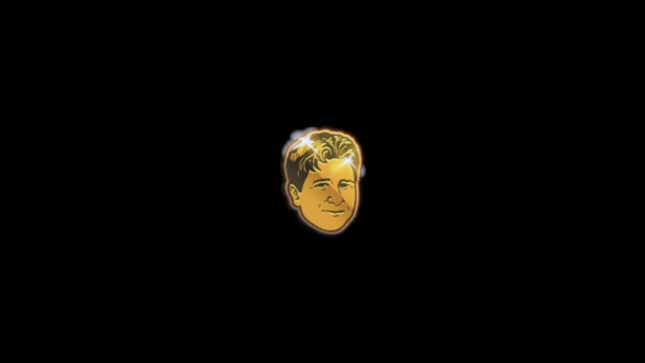
For perhaps as long as Twitch has existed, there has been a myth: On exceedingly rare occasions, if the stars align perfectly, the ever-popular “Kappa” chat emote will turn gold. Some have suggested that a single Twitch user receives golden Kappa abilities every 24 hours. Others believe you have to fulfill highly specific prerequisites in order to unlock it. Yesterday, out of the blue, Twitch gave it to everybody. Twitch streamers and viewers, in turn, did not give a shit, because they were too busy recovering from the DMCApocalypse.
Last week, Twitch abruptly deleted thousands of videos in compliance with copyright complaints from the Recording Industry Association of America (RIAA) and other music industry entities. The Amazon-owned platform did not tell streamers what it had deleted, nor did it give them a chance to dispute claims. Instead, the company encouraged them to delete all of their clips and VODs, just to be safe, and pointed them to new tools they could use to avoid running afoul of DMCA rules in the future. This was understandably heartbreaking for many streamers, who had to scramble to download and reupload their histories elsewhere before those suddenly sordid pasts got them permanently booted from their place of work. As of now, streamers are still fuming and bracing themselves for whatever happens next.
Yesterday, Twitch took to teasing something that’s happening on November 14 (likely a digital convention called GlitchCon), as though everything is right as rain and not a corporate-friendly garbage fire. Twitch tweeted out a video that said “There’s a place where all Kappas are golden” and then temporarily turned all Kappa emotes gold. Though marketing campaigns like this are often planned in advance, the timing of this one felt conspicuous to... basically everybody.
“Huge shoutout to Twitch for solving the DMCA situation with Golden Kappas,” said popular WoW streamer Asmongold on Twitter.
“Of all the things that could be helpful to post about to your audience right now, shiny emotes is not one of them,” said Twitch partner Negaoryx. “I love Twitch, but seriously, come on.”
“Twitch’s users: Crying while deleting 10 years worth of VODs and content,” said artist Justin Wharton. “Twitch: GOLDEN KAPPAS!!!!!”
“Twitch gets slammed by the music industry, meanwhile they changed all the Kappas to gold, maybe in the hopes we all forget about how terribly the company has been running,” said Rocket League pro Lethamyr. “I think it’s nearly time to stream live on YouTube.”
As all of this was happening, Twitch stat tracker DeTheBug shared some interesting statistics: Yesterday, the phrase “Kappa” peaked at 23,688 uses per minute across Twitch. On October 23, the day Twitch began processing DMCAs again, the phrase “DMCA” topped out at 26,614 uses per minute. In the following days, it has hovered at around 10,000 uses per minute. In other words, a whole lot of people are talking about DMCAs right now. The controversy has not just blown over.
Meanwhile, around the same time, Variety published a piece about a letter in which the RIAA, the Recording Academy, the National Music Publishers Association, the Music Managers Forum, and more than a dozen other organizations accused Twitch of “allowing and enabling its streamers to use our respective members’ music without authorization,” failing to adequately respond to copyright claims, and botching the licensing for the new Soundtrack by Twitch feature, which gives streamers access to (ostensibly) rights-cleared music. Twitch refuted these claims in a statement, but RIAA chairman and CEO Mitch Glazier persisted, telling Variety that “Twitch continues to turn a blind eye to the same users repeatedly violating the law while pocketing the proceeds of massive unlicensed uses of recorded music.”
This is, of course, hilariously wrongheaded; it’s not like streamers are raking in dough because viewers trawl the site, vainly searching through millions of channels for the one streamer who’s playing their favorite song at any given moment. But it nonetheless implies further action on the part of the RIAA, which could endanger streamers’ careers. Given how little Twitch has done to get streamers off the hook (even compared to other platforms like Facebook), streamers are understandably concerned.
But hey, golden Kappas, right? They’re like regular Kappas, but gold! Exciting!!!
Update: 6:45 PM: In a statement to Kotaku, Twitch insisted that it is taking a by-the-book approach to music licensing.
“We’ve partnered with dozens of labels, music distributors and promoters to ensure artists and songwriters have these opportunities during this challenging time,” said a Twitch spokesperson in an email. “We’ve also continued to support the music economy by paying royalties to performing rights organizations like ASCAP, BMI, SESAC, and GMR, and licensing fees to labels and publishers for the use of music in Twitch’s own productions and projects. We are contributing to the health of the music community, and we are proud of that.”
As for Soundtrack by Twitch, the company said that it’s “a fully licensed service” and that “Twitch has entered into agreements with rights holders for the recordings and compositions included in the service.”
So for now, Twitch is standing its ground. This does not, however, answer the looming question of what will happen if the music industry decides to push even harder and, if so, how much streamers will be expected to shoulder the burden.